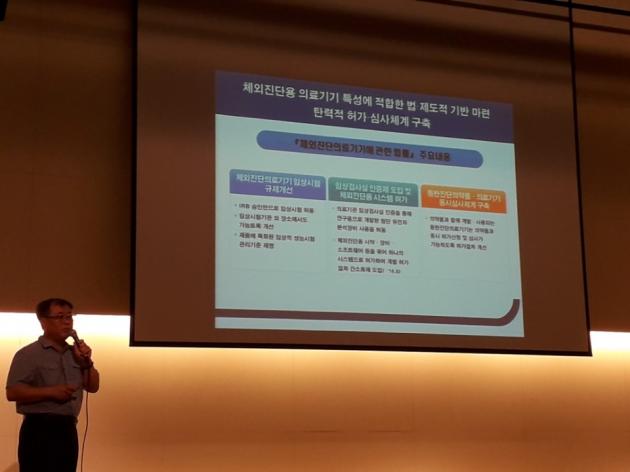The government is seeking to allow companies to sell potentially valuable medical devices even if their clinical grounds are insufficient.
Ahn Myeong-su, a section chief at the Ministry of Food and Drug Safety’s Medical Device Policy Division, explained how the government plans to push for certifying innovative medical device manufacturers and introduce the Unique Device Identification (UDI) system for medical devices, at a policy briefing session at the Ferrum Tower in central Seoul, Thursday.

“Companies are briskly developing new integrated medical devices with advanced technologies. If we don’t have a related product category or guidelines, we find it difficult to give them approval. So, we have been publishing review and assessment guidelines for each different type of product category,” Ahn said.
He went on to say, “The U.S. Food and Drug Administration recently requested to share our materials on guidelines for artificial intelligence (AI)-based medical devices. We will continue to build the approval and assessment system for medical devices, ahead of other countries.”
Late last year, the ministry established guidelines for the approval of medical devices that use big data and AI technologies. It also set up a guide for evaluating the clinical effectiveness of AI-based medical devices.
At the policy briefing, Ahn introduced the government’s plan to ease rules on the change of approval conditions for medical devices.
Currently, a medical device manufacturer needs the ministry’s approval to change approval conditions, except for 10 designated cases of a minor change. From March next year, however, the government plans to allow immediate changes of approval conditions for all medical devices, except for significant changes that require approval.
Besides, the government is preparing to set Good Manufacturing Practice and clinical trial criteria, tailored for advanced medical devices and in vitro diagnostic devices, Ahn said.
The government will address the issue of many companies failing to pass the government’s assessment of new medical technologies, even after winning the nod for their devices as newly integrated medical devices with advanced technologies, he added.
“Some advanced devices failed to be released in the market because their manufacturers could not secure clinical trial data and documents as required by the National Evidence-based Healthcare Collaborating Agency (NECA) for the assessment of new medical technologies,” Ahn said.
He added that hospitals find it difficult to use locally-developed products, which was why medical devices makers struggle to secure clinical grounds.
“So, we will evaluate the potential value of an advanced medical device, allow them to be used first, and assess them later,” he said.
He went on to say, “As for the assessment of the potential value, we will do it through a commission where experts and civic groups will also participate in. We are setting the timeline to implement the policy by the first half of next year.”
The ministry is also pushing to enact a special law to support high-tech medical devices.
“By enacting a special act, we will introduce a customized safety management system for high-tech medical devices, improve patients’ access through quick approval reviews, and encourage the development of advanced medical devices through policy supports for technologies and commercialization,” Ahn said.
The special act proposed to the National Assembly includes designating advanced medical devices. Possible targets include AI- and big data-utilizing software, intelligent robots, companion diagnostic devices, genetic analysis devices, 3-D printers, virtual and augmented reality, and integrated medical devices.

